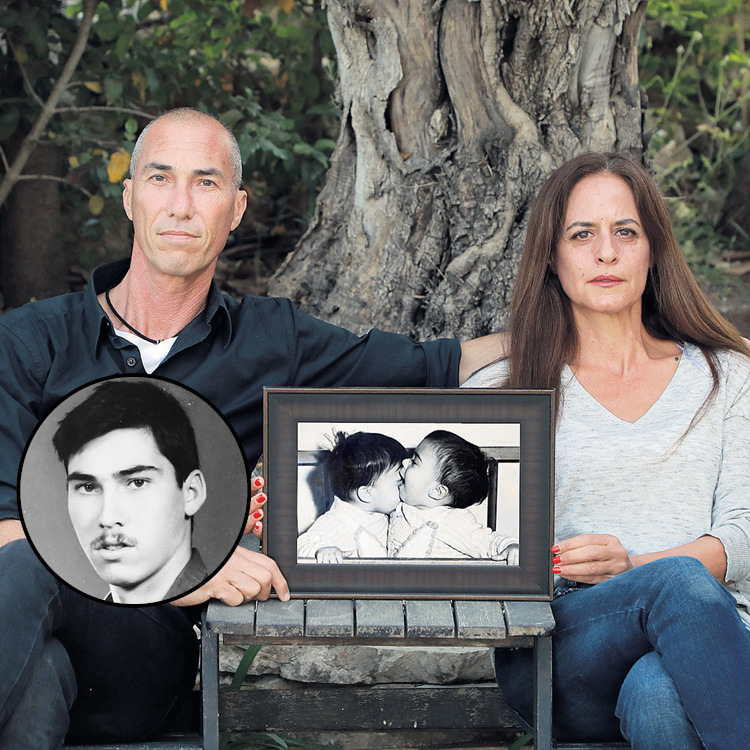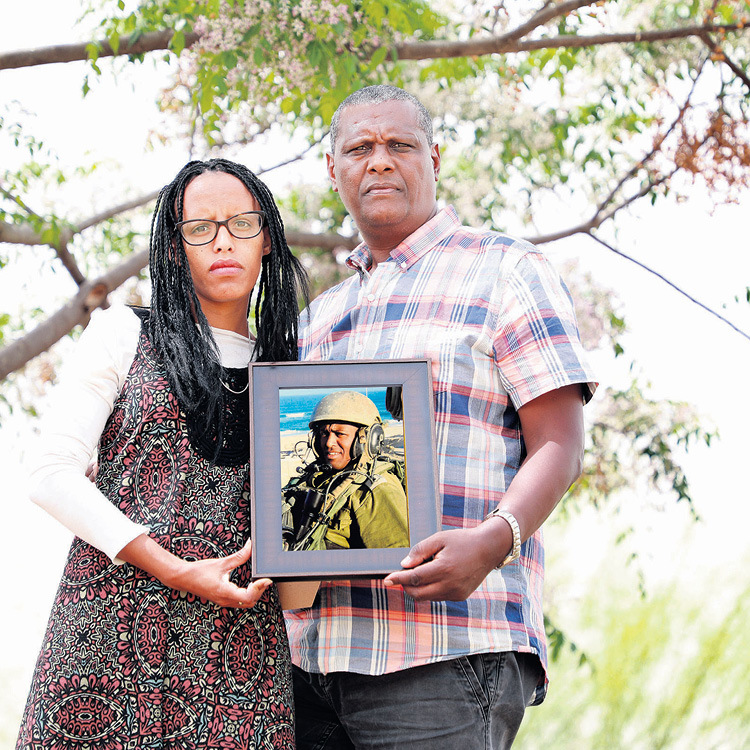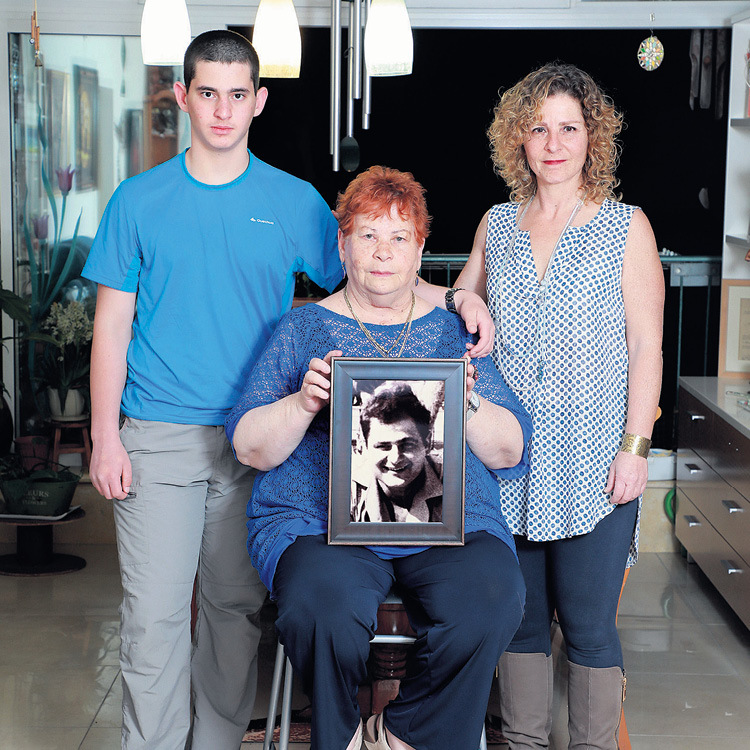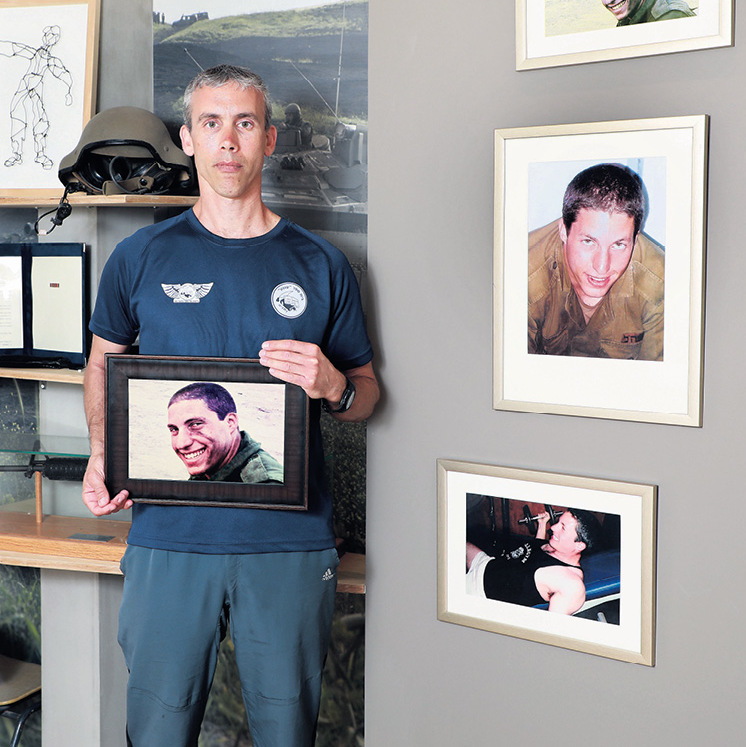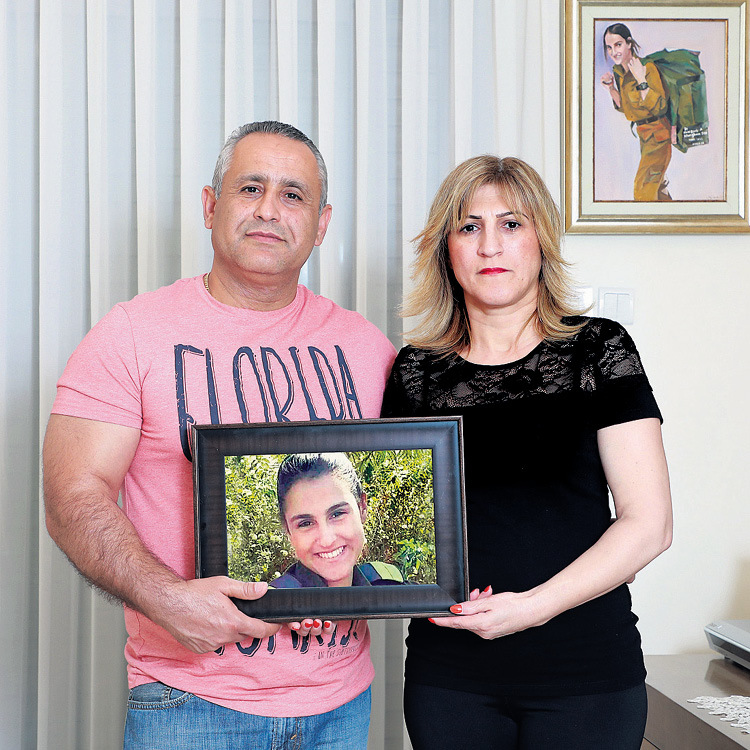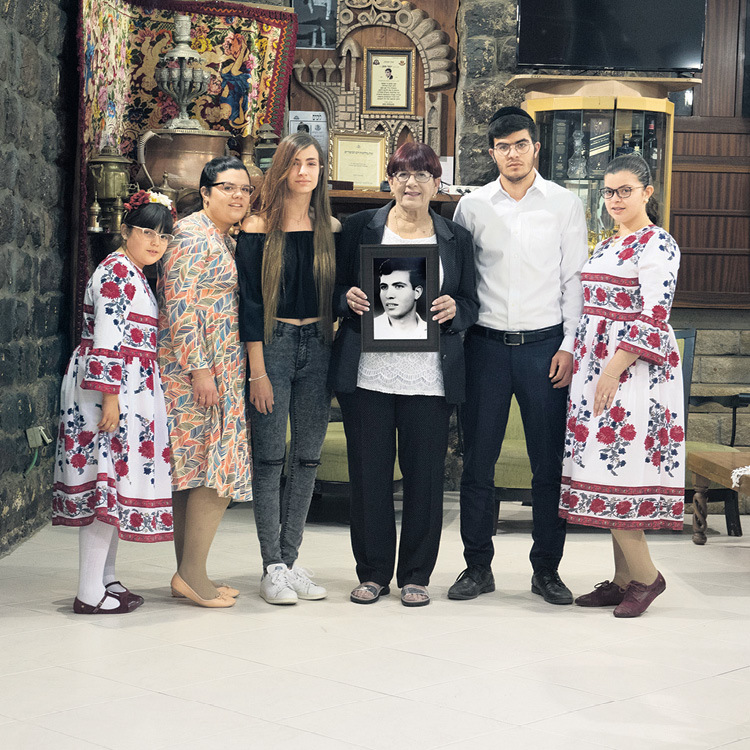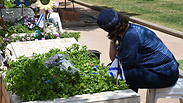
Bereaved families of fallen soldiers tell their story
They didn't hesitate to charge forward and face the danger, whether under fire, threatened by knives, missiles or explosive devices; On the eve of Memorial Day, the bereaved families of fallen soldiers speak about their loved ones, their lives, their loss and the vacuum and inspiration they left behind.
They fight, risking their lives in the line of duty to protect the citizens of Israel, and at times even give their lives to the cause—leaving behind families who have to cope with the pain of their loss and try to move forward.
These are some of their stories.
Died aiding the wounded of a suicide bombing
Sgt. Maya Kopstein, 19Received Head of Regional Command Citation, First Intifada
Eitan Kopstein lost many of his friends in the 1973 Yom Kippur War. When he returned home, he decided to immediately marry his girlfriend, Irit, and became a father as soon as he could.
"I was very young, only 20 years old, when Maya was born," said Irit Kopstein, now 62. "Eitan really wanted to have a child, to raise a family. He went through horrors in that war."
Maya was born in July 1975. "Even as a baby, she never stopped talking. Wherever she was, she stood out and excelled. She was amazing," said her mother.
When Maya was seven, her mother gave birth to her sister, Adi. Due to complications during labor, Adi was born mentally disabled. "Maya always took care of Adi, cared for her and did everything for her. I knew that even if something were to happen to me, there will be someone to care for Adi," Irit shared.
In 1993, Maya enlisted in the IDF's Paratroopers Brigade as a communications instructor. "She fought for it," said Irit. "She was proud to wear the uniform and the red beret."
On Sunday, January 22, 1995, Maya was at the Beit Lid Junction when she heard an explosion. It was the first suicide bombing by the Palestinian Islamic Jihad.
In a description of her actions detailed in the citation Maya received posthumously, it was written that "eight IDF soldiers were killed in the first explosion. The soldier Maya Kopstein hurried to the scene of the incident to help evacuate the many people who were wounded, despite hearing alerts on a potential second explosion. When she arrived at the scene, a second suicide bomber blow himself up, and Maya was killed."
"Many ran away, but Maya stayed to care for her commander, Eyal Levy," said Irit. "I would've been surprised if she hadn't. It's Maya, after all. There were moments when I was angry at her for staying. I'm proud that she did such a brave and noble thing, but I need her with me. Had she only thought of herself, she would've been here today."
There is one moment Irit says she will never forget. "When I got that knock on the door"—telling her that her daughter had been killed—"I don't wish that knock on anyone in the world. One moment later—and there's no more joy."
Time doesn't heal; it's a lie," Irit added. "I live with Maya every day, every hour, every second. Talking to her and asking her to give me strength to carry on. It's been 22 years and I still can't believe it. I've stayed then, at that knock on the door."
The twin who didn't return from battle
Second Lt. Amir Binyamini, 20
Received Brigade Commander Citation, 1982 Lebanon War
Twin brothers Amir and Yaron Binyamini did everything together. They went to the same school, practiced martial arts together all through high school, received black belts together, enlisted in the Armored Corps together on the same day in November 1980, and even went through basic training and the tank commanders' course together.
Only then did their paths part. Amir went on to be an officer, while Yaron preferred to stay a conscript.
The first Lebanon War broke out while Amir was undergoing officer training. "I served in the 9th Battalion of 211th Brigade, as a tank commander in the western sector in Lebanon. My brother served in the eastern sector together with his friends from the course," Yaron recounted.
Yaron's battalion fought for several days on the outskirts of Beirut. During a temporary truce, Yaron was told that the battalion commander wished to speak with him. "I though he wanted to go over mission details," Yaron said. "I walked into the tent. Several officers were sitting inside, and they told me 'come sit down, we have something personal to tell you. Grab a glass of water.'
"At first I thought that something had happened to my dad, because he had heart problems, but then they said 'your twin brother was killed. Pack your things and head back to Israel.' They put me on a transport that took me several kilometers to western Lebanon, where I had to hitch a ride on a supply van to the border at Rosh HaNikra."
Because he was deep inside a war zone and the technology in the early 80s was not as good as it is today, it took six days to find Yaron and deliver the news, and the family postponed the funeral awaiting his return.
"When I got home, I saw a lot of people there, like in a shiva (the seven-day Jewish mourning period). I found my parents and hugged them. I couldn't cry, it felt like they expected me to be their crutch. It might have been the only thing that was keeping me together. There is no word to describe the pain of losing your twin. It's a pit that sucks you down, if you only let it."
Second Lt. Amir Binyamini was killed in battle in Ein A-Tina, Lebanon, on June 18, 1982. His tank crew, which made a decisive contribution to achieving the objectives of their battalion and brigade, all received citations. Only one of the four survived.
Yaron's girlfriend Anat helped him through the mourning period. Three years later, they got married and went on to have three children, naming their firstborn Amir.
"There is a feeling of great loss because Amir is not around, like we are always missing something," said Anat Binyamini. "The family is not whole without him. People couldn't tell Amir and Yaron apart, but I could. It would have been interesting to see where he would've taken his life."
"I thought it'll get easier with time, but it only gets harder," Yaron concluded. "Losing your twin feels like being maimed. Part of me died with him."
Insisted to join the mission despite his health
Command Sgt. Maj. Beinisian (Danny) Kashon, 39
Received Brigade Commander Citation, Operation Protective Edge
On July 21, 2014, several suspicious figures were spotted near Nir Am, a kibbutz near the Gaza border, in early hours of the morning.
Lt. Col. Dolev Kedar, the area's battalion commander, decided to head out to the area and check it out.
Since the battalion was new to the area, having arrived only a few days earlier, a senior tracker in the Geffen formation joined the mission—Command Sgt. Maj. Beinisian Kashon. Kashon was not supposed to join this mission because of his health situation, but he insisted on it.
On their way there, anti-tank missiles were shot at their vehicle. Kedar, Beinisian and a third soldier exited the vehicle to fight a terrorist cell that charged at them following the shooting. They were all killed, as was their vehicle's driver.
Kashon had served in the IDF for 21 years prior to his death. He was injured in the line of service in a vehicular accident, suffered intense pains in his leg, but fought for two-and-a-half years to return to the field.
Hundreds of his brothers in arms, residents of Netivot—his city of residence and members of the Ethiopian community from all over the country came to bid their farewells. A famous picture was taken in his funeral—one of his wife, Galit, on her ninth month of pregnancy, walking behind his coffin while holding the hands of their three children. She gave birth a week after he was buried.
"Every time they talk about my big brother in past tense, it's hard for me to accept. I prefer to think that he's someplace far away, and there's no way to contact him," said Kashon's sister. "Not a day passes where I don't reminisce about him.
"I miss him the most on Route 40. Before he was killed I worked in Petah Tikva, and almost every night, when I was driving on that road on my way home, he would call me. Since then, every time I drive on that road I find myself expecting his call, and start crying."
"Kashon was my life's first project," said his brother. "I managed to bring him to Israel from Ethiopia after great efforts. He was something special to me; Not only a little brother, but a close friend.
"He always encouraged me to exercise, and to this day I run to remember him each day. He is impossible to forget. His friends from the army still come to pay their respects. The time that passes does nothing to ease our pain."
'Treat the other wounded, I have no chance'
Sgt. Yekutiel (Kuti) Novik, 27
Received Medal of Distinguished Service, Six-Day War
Ruth met Yekutiel when they were both 18 years old. They dated throughout their military service, and at 21 decided to get married. "We had two children, Yaron and Orit. And then the Six-Day War broke out," said Ruth, now at the age of 76.
Mobile communication technology back then was still undeveloped, so it was nothing out of the ordinary for her not to hear from him. "When the war ended soldiers started coming back home, but Kuti never returned. I searched for him, asked anyone who could have known. Later I found out that they weren't allowed to tell me what happened. That some of them knew, but said nothing," she said.
She only found out what happened weeks later. "(Record-keeping in) the war was a mess. They didn't keep good track of who died and it took them a while to tell the families what happened," she said. "It turned out that they buried my husband, the father of my children, in a temporary grave in Afula and didn't even tell me."
Even when he was awarded the Medal of Distinguished Service, Ruth refused to acknowledge his bravery. "I was mad at him. I was sure he gave up (on us)," she added.
Only 40 years later did she open his file and found out what really happened: his half-track was hit by enemy fire and caught fire. Novik, who suffered the heaviest wounds, told the medics "treat the other wounded, I have no chance." A few minutes later he died of his wounds.
"Only then did I truly have to face the reality. I had to acknowledge that he didn't want to leave me behind by myself, but he didn't have a chance. Until that day I never cried, but that changed that day. I finally had to let go of my anger," Ruth confessed.
Orit was only a year old when her father fell in battle. "I don't have even one picture with him. I have no memories of him. It’s a great absence that accompanies you throughout your life."
The rescue tank never gave up
St.-Sgt. Adam Goren, 21
Received Head of Regional Command Citation, 2006 Lebanon War
Adam was born exactly on his mother's 40th birthday. "She always said it was the greatest present she could have gotten," said Hanan, Adam's older brother.
Two years after his death, his mother wrote a eulogy for him. "Adam. My sweet child. Not a day passes where I don't think of you," she wrote. "In the mornings, when I go to open the window, I touch your picture on the wall. I caress your beautiful face, your bright green eyes, and drown in them.
"Adam. My beloved son. I miss the evenings when we sat together in front of the TV and watched movies. I remember how we laughed about Gollum's character from Lord of the Rings. I remember how you tried to impersonate him, and actually managed to do it pretty well.
"I miss the little things. Things that stayed with me, like the way you used to hum a tune, and how I knew it meant you were happy. I love you. Mom."
Adam's mother passed away six years after his death, due to illness. His father passed away three years after she did, also from illness. When the soul does not recover, sometimes the body gives up as well.
In a memorial room dedicated to Adam in his home town of Ma'abarot, a display showcases his rifle, armor, helmet and picture—a handsome and happy-looking young man.
"Adam chose to serve in the Armored Corps, said Hanan. "He was trained as a loader-signaler for a Merkava Mark IV tank and was proud of his service. My brother was very humble, always with a shy smile, always saying 'do what you can to serve your country.' He always sought to contribute more. For all the complexity and fatigue of army service, he loved it."
When the Second Lebanon War broke out, Adam was due to be released and so was stationed as back-up for the main forces. "He wasn't even supposed to fight in Lebanon. But for Adam to give up on that? He insisted to go and fight in until they finally let him," explained his brother.
Adad joined a tank crew under the command of Captain Bania Rine. They were called "Force Bania." They carried out heroic evacuations of wounded soldiers while under fire, in one such incident saved 8 soldiers from Hezbollah territory before they got hit by an anti-tank missile.
On August 12, 2006, on their way to a complex evacuation mission, during the last days of the war, their tank was hit by a missile in the eastern Lebanon sector. It caught fire, and moments later exploded, killing all four crew members.
Adam received a citation for his "adherence to the mission and striving for victory, providing an example for fellow soldiers and showing remarkable comradely, decisiveness and self sacrifice."
Shot the terrorists, saved lives
Lance Corporal Hadar Cohen, 19
Received Police Medal of Distinguished Service, Knife Intifada
"Two weeks before it happened, my sisters sat with Hadar and asked her: 'how will you know how to fight? When a terrorist attacks will you know what to do?' She told them: 'What did I enlist for, to sit and look at him while he kills? Yes, I will know.' And she did," said Sigalit, Hadar's mother.
On February 3, 2016, three armed terrorists arrived at Damascus Gate. They attacked, and Hadar shot two of them, saving her friend from one of them who was trying to cut her throat. Unfortunately, she didn't spot the third one, who shot her in the back—killing her.
Her mother recalled how Hadar's commander had been so impressed with her daughter's performance and response.
"Her company commander told me how she got into stance, drew her weapon, aimed and fired, doing everything by the book. He told me 'if you take any other officer or soldier who served in her sector for a year or two, not one of them would do it as well as she did,'" she said. "She didn't hesitate. With all her courage she stood her ground and did what needed to be done."
Hadar's family received the Police Medal of Distinguished Service last year on her behalf. "It's a shame it ended this way. It's very difficult," confessed Sigalit. "I still can't fully accept that she's gone. The days go by and I miss her more with each day that passes."Since she died, eight babies were named after her. I keep contact with all of those families. They are all lovely, and mean well, but it is no consolation for me," a broken-hearted mother said. "I just want her back."
'We were raised on stories of his bravery'
Sgt. 1st Class Yosef Maman, 28
Received Medal of Distinguished Service, Yom Kippur War
In the corner of the living room of Yosef's parents stands a commemorative area, packed with Maman's pictures, newspaper pieces and the personal gear he had on him at the time of his death. This corner serves as inspiration for his seven grandchildren, who's grandfather's story of courage accompany them throughout their lives.
Maman was born in Casablanca, Morocco and immigrated to Israel with his parents when he was just an infant.
During the Yom Kippur War he served as a vehicle technician for a mechanized infantry unit stationed in the Golan Heights. On October 8, 1973, a half-track got hit during a mission. The combatants got out and took cover, but Maman moved quickly to the spot and repaired the malfunction while under enemy fire.
On October 12, 1973, during battle, a malfunction occurred in the company commander's half-track and all the soldiers took cover, but Maman went out under heavy artillery fire to repair it. He was wounded and killed while working.
"In those actions, Sgt. 1st Class Yosef Maman served as a model of dedication, bravery, and superior professional performance," wrote former IDF Secretary-General in his explanation of why the medal was awarded to Maman.
He was survived by a wife and two children, who were five and one years of age respectively at the time of his death.
His grandson, Yosef, was named after him. "I was raised on stories of his bravery," he said. "I was told of his heroism, and how much he devoted his life to caring for others. I grew up learning of his actions, of how he took initiative and tried to save his crew," Said Yosef, speaking of the inspiration his gained from his grandfather .
Isaac Dabush, Danny Adeno Abebe, Eitan Glickman, Roi Yanovsky, and Israel Moskowitz contributed to this report.
(Translated & edited by Lior Mor)










